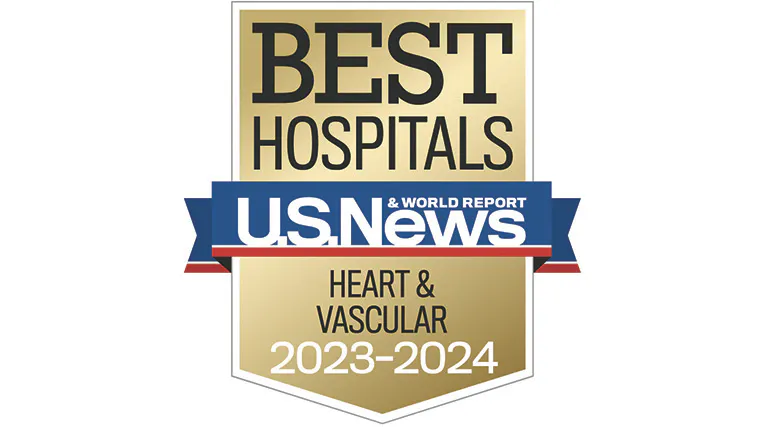Ventricular Tachycardia Causes and Symptoms
The University of Chicago Medicine’s Ventricular Tachycardia (VT or V-Tach) Program specializes in high-risk and complex cases. Our VT program is highly respected across the United States, with national referrals from over 26 states, because of our advanced techniques, leading-edge treatment options and groundbreaking clinical trials.
Why Choose UChicago Medicine for Ventricular Tachycardia Care
- Recognized as one of only a few hospitals in the United States that offers all three commercially available mapping system technologies
- A multidisciplinary team that works together to create and deliver an individualize treatment plan for each patient
- Through close collaboration with cardiac surgeons, we offer minimally invasive surgery when a patient’s condition requires surgical care
- Coordinate with interventional cardiologists to treat high-risk patients by temporarily implanting a pump assist device to maintain adequate blood pressure and flow during a procedure
- Nationally ranked for our specialized epicardial techniques that allow us to treat the outside surface of the heart at the same time we perform standard heart procedures on the inside of the heart (endocardial)
- Routinely treat patients who have undergone unsuccessful VT therapies at other institutions
- Specially designed our arrhythmia technology suite to maximizes innovation and education, allowing us to train visiting physician around the world through case observation
- Maintain a prospective database in order to advance science through publishing the safety and outcomes information for ablation procedures
What is Ventricular Tachycardia?
Ventricular tachycardia occurs when the lower chambers of the heart beat much faster than a normal resting heartbeat, which should range between 60 to 100 beats per minute. Unlike arrhythmias that develop in the top chambers (atria), VT arrhythmias evolve in ventricles, which are the main pumping chambers of the heart and can result in palpitations, lightheadedness, fainting (syncope) or cardiac arrest and sudden death. VT can occur is both structurally normal hearts (more benign), but it is more common in patients with heart disease (life-threatening).
In addition to VT, there are also milder forms of ventricular arrhythmias, including premature ventricular contractions (PVCs), where patients can have frequent single-skipped beats. If you are experiencing similar symptoms, UChicago Medicine arrhythmia (heart rhythm) experts can help diagnose, management and treat your VT.
Ventricular Tachycardia Causes and Risk Factors
Ventricular tachycardia does not have one definitive cause, but there are several pre-existing heart conditions that can result in scar tissue developing on the heart, which leads to abnormal electrical signals. Because of this, VT is often a sign of additional heart disease that has damaged the heart and, if untreated, can worsen or even become fatal.
Common sources of VT include:
- Prior Heart attack
- Cardiomyopathy (weak heart muscle)
- Heart valve disease
- Arrhythmogenic RV cardiomyopathy
- Inflammatory myocarditis (viral, sarcoidosis)
- Inherited or congenital heart disease (tetralogy of Fallot)
Knowing more about your heart health and family history of heart disease is a crucial first step in preventing further damage to your heart and minimizing your risk for VT.
Symptoms of Ventricular Tachycardia
Identifying symptoms of VT can be difficult if your abnormal heartbeat is short, meaning it lasted less than 30 seconds (nonsustained). If you are experiencing infrequent, brief episodes of VT, you may not have any symptoms. If you have recurring, sustained VT with incidents lasting 30 seconds or more, you could experience:
- Dizziness and/or lightheadedness
- Palpitations (fluttering feeling in your chest)
- Chest pain
- Fatigue
- Shortness of breath
- Syncope (fainting)
- Lost of consciousness
- Heart attack/cardiac arrest
If you are experiencing one or more of the symptoms above, please contact your doctors as soon as possible. The earlier we can diagnose your condition, the faster we can develop a treatment plan.
Other Types of Ventricular Arrhythmias
Premature ventricular contractions are described as extra beats in you heart, and can be common if you smoke, frequently eat or drink caffeine, have low electrolytes or have increased stress. PVCs do no typically require treatment, but for more advanced PVCs, we may recommend medications, catheter ablation or lifestyle modification, such as minimizing your caffeine and smoking.
Ventricular tachycardia is a serious condition in which a heart beats so quickly that not enough blood is pumped into the heart and out to the rest of the body. If you are experiencing chest pain, rapid heartbeats and trouble breathing, call 911. If you do not seek treatment immediately, there is a severely increased risk of heart attack or even death. Pre-existing ventricular tachycardia is the most common cause of VFib, so talk to you doctor about how to prevent VFib early.
A congenital condition, Long QT syndrome is a type of ventricular tachycardia caused by a genetic mutation that leads to erratic electrical impulses (heartbeats) that increase over overtime, eventually causing serious ventricular tachycardia. If you have LQTS symptoms can include seizures, fainting, and for serious cases, cardiac arrest if your heart beat doesn’t normalize. Our experts can help you find the right treatment for your needs. Other inherited defects in ion channels can include Brugada syndrome, catecholaminergic polymorphic VT and short QT syndrome.
Our Arrhythmia Services
Nationally Ranked in Cardiology, Heart Surgery and Vascular Surgery

Recent VT Publications
Ventricular Tachycardia Locations Near You
Request an Appointment
To speak to someone directly, please call 773-702-9461. If you have symptoms of an urgent nature, please call your doctor or go to the emergency room immediately.
* Indicates required field
